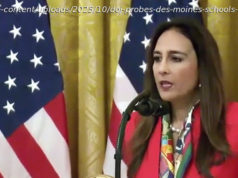The Justice Department asked the Supreme Court to clarify which immigrants and refugees can be barred under the travel ban.
WASHINGTON — It didn’t take long for the Supreme Court’s decision on President Trump’s travel ban to reach the… Supreme Court.
But the latest battle isn’t over whether travelers from predominantly Muslim nations can be barred from entering the United States, or which countries are included. It’s about picking and choosing who can get in and who must stay out.
Supreme Court Justice Clarence Thomas predicted this next round of court battles on June 26, when the high court partially restored the controversial travel ban after a series of lower court decisions against it. The justices said only immigrants and refugees with a „bona fide“ connection to the U. S. can be exempt.
„The compromise … will invite a flood of litigation until this case is finally resolved, “ Thomas wrote.
Federal district court Judge Derrick Watson ruled Thursday that the Trump administration was „unduly restrictive“ in implementing the ban by allowing only spouses, children, parents, siblings, fiancés and in-laws. Watson opened the door to grandparents, grandchildren, aunts, uncles, nieces, nephews, cousins and siblings-in-law.
And while the administration decided only refugees already in contact with resettlement agencies could enter, Watson’s ruling would allow for more.
That led the Justice Department to ask Friday night for the Supreme Court’s „immediate intervention“ in the case, just 18 days after it blocked lower court rulings that put the travel ban on hold.
„Only this court can definitively settle whether the government’s reasonable implementation is consistent with this court’s stay, “ the government argued.
The court also had accepted the case for a more complete oral argument in the fall, in order to decide whether it violates the Constitution’s protection of religion by targeting Muslims. That case, however, could become moot if the administration concludes its vetting procedures this summer.
Watson’s ruling on travelers from six countries — Iran, Libya, Somalia, Sudan, Syria and Yemen — „empties the court’s decision of meaning, as it encompasses not just close family members, but virtually all family members, “ the government said in seeking the justices‘ intervention.
The judge’s ruling on refugees, the administration argued, would apply to „every refugee permitted to enter the United States.“
Lawyers for Hawaii, which along with immigration rights groups had stymied Trump’s efforts in courts across the nation, are sure to oppose the government’s request that the Supreme Court either clarify its June 26 decision, strike down Watson’s ruling or temporarily block it from increasing the flow of immigrants and refugees while it’s appealed.
Trump’s order calls for a 90-day ban on entry to the U. S. from the six countries and a 120-day ban on admitting all refugees, in order to give the administration time to improve screening efforts to ensure terrorists do not sneak into the country.
Watson’s latest interpretation was being reviewed Friday by the State Department, which said it would work with Justice Department lawyers to ensure „immediate implementation.“
Watson’s ruling comes in the same week the U. S. admitted its 50,000th refugee for the 2017 fiscal year, reaching the annual cap established by Trump that is down from the 110,000 limit established by President Obama in his final year in office.
That means the administration will stop accepting new refugees for the remainder of the fiscal year, which ends Sept. 30. The only exceptions will be those with close family relationships as defined by the Supreme Court.






